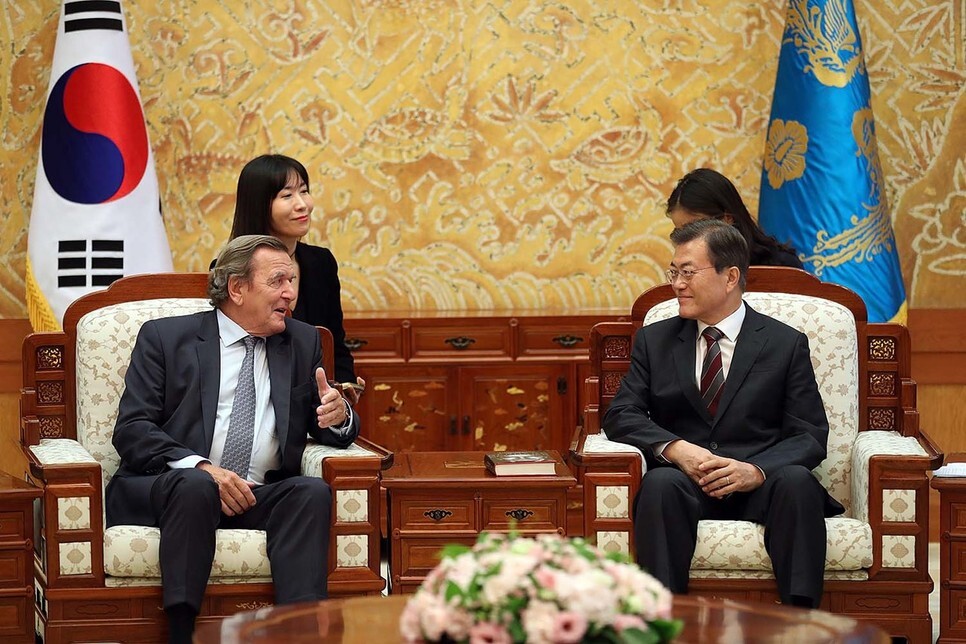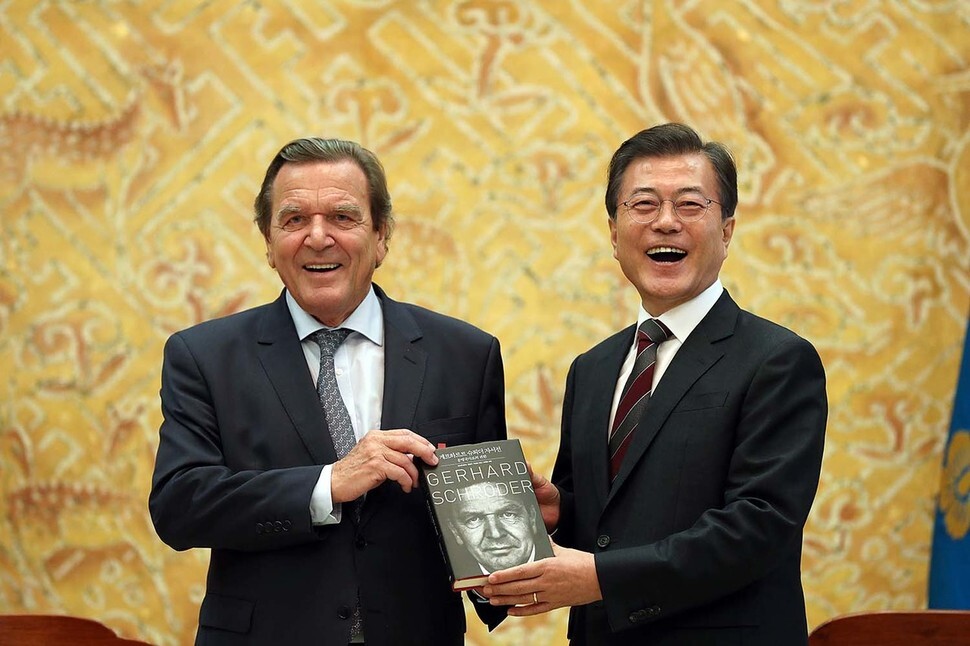hankyoreh
Links to other country sites 다른 나라 사이트 링크
President Moon meets with former German Chancellor Schröder at Blue House

President Moon Jae-in showed his frustration over the failure to resolve historical issues between South Korea Japan in a meeting on Sept. 12 with former German Chancellor Gerhard Schröder.
“Germany was able to move toward the future with sincere reflection on its past, yet in our case those issues remained unresolved,” he said. Moon met at the Blue House that afternoon with Schröder, who talked about his Sept. 11 visit to the House of Sharing, a residence for comfort women survivors.
“You visited the House of Sharing where the comfort women survivors live and consoled them while looking pack on historical matters,” Moon said by way of expressing appreciation for Schröder’s gesture.
Schröder said he was “deeply moved to meet with [the survivors] and to see the scars left on them by Japan’s atrocious actions.”
“We talked about how Japan has yet to apologize, and the women told me, ‘We don’t have any hate or want revenge. All we want is recognition from Japan of the things that happened in history,’” he recalled.
“Their suffering must be acknowledged historically,” he added.
During his meeting with Moon, Schröder wore a “memory bracelet” given to him at the House of Sharing by survivor Lee Ok-seon. While visiting the home the day before, Schröder was critical of Japan’s failure to apologize, stressing that the “individual sacrifices and suffering experienced by the women are no different from the Holocaust,” a reference to the slaughter of Jews by Nazi Germany during World War II.
Schröder also said the “second most moving thing was the film ‘A Taxi Driver.”
“I was deeply moved to see the way young people risked their lives to achieve democracy,” he said, while discussing the recent film which portrays the May 18 Gwangju Democratization Movement through the eyes of German journalist Jürgen Hinzpeter and the Korean taxi driver who avoided police and military roadblocks to take him into the city.
“While stories of the past are important, I also think stories of the present are important. Apparently the new administration has been planning some major changes and reforms throughout the economy and society,” he continued.
A warm conversation ensued, with Moon replying that he had also seen “A Taxi Driver.”
Moon also observed that the “efforts of [German journalist] Jürgen Hinzpeter in risking danger to share the truth about [the Gwangju Democratization Movement in 1980] was a big source of strength in carrying on its legacy.”

“I want to thank Germany for the way it has worked for South Korean democracy at every critical moment,” he said.
“While the Gwangju Democratization Movement seemed to have been thwarted at the time, it did ultimately lead to South Korean democracy, and I also think it was the source of the candlelight revolution that raised South Korean democracy up again when it recently collapsed,” he continued.
In a written briefing after the meeting, Blue House spokesperson Park Soo-hyun said Moon and Schröder had also discussed the “grand social compromise” the Moon administration is currently pursuing.
“President Moon praised ex-Chancellor Schröder’s comprehensive social and labor reforms as a driving force reviving the German economy and competitiveness and steering the German economy in a sound way,” Park reported.
In response, Schröder said the Moon administration’s attempts to achieve a grand social compromise through its Economic and Social Development Commission “are clearly the right thing to do,” adding that “Germany today proves that such an effort is the right thing.”
“Although it may be hard to pursue [a grand social compromise], it is certainly worth it,” he said in a message of encouragement.
Moon acknowledged that there were “some South Koreans who are nervous about the new administration’s push to raise the minimum wage, create jobs by reducing working hours, and achieve income-driven and inclusive growth because they represent a change from the previous economic approach” and added that it would be “an important task to continue alleviating those concerns through communication and persuasion,” Park reported.
Before his conversation with Moon about history and social compromise, Schröder presented Moon with a Korean-language copy of his autobiography “Decisions: My Life in Politics” and a coffee grinder as gifts. He also said he “hopes there will be day when I can see you in my office in Hannover.”
“I heard that you really like coffee. The best-tasting coffee is the kind where you grind the beans yourself,” he said in presenting his gift. “I brought this coffee grinder in the hopes that you can enjoy the best flavor when you think of coffee while you’re working.”
The coffee grinder was reportedly Italian-made rather than German. “I’m sure you are wondering why I brought something Italian,” Schröder said, drawing laughter from the attendees.
After congratulating Schröder on his autobiography’s publication in Korean translation, Moon went on to say Germany’s “experiences with new and renewable energy will be very much a point of reference in our new administration’s policies.”
By Jung Yu-gyung, staff reporter
Please direct questions or comments to [english@hani.co.kr]

Editorial・opinion
![[Column] Season 2 of special prosecutor probe may be coming to Korea soon [Column] Season 2 of special prosecutor probe may be coming to Korea soon](https://flexible.img.hani.co.kr/flexible/normal/500/300/imgdb/original/2024/0426/3317141030699447.jpg) [Column] Season 2 of special prosecutor probe may be coming to Korea soon
[Column] Season 2 of special prosecutor probe may be coming to Korea soon![[Column] Park Geun-hye déjà vu in Yoon Suk-yeol [Column] Park Geun-hye déjà vu in Yoon Suk-yeol](https://flexible.img.hani.co.kr/flexible/normal/500/300/imgdb/original/2024/0424/651713945113788.jpg) [Column] Park Geun-hye déjà vu in Yoon Suk-yeol
[Column] Park Geun-hye déjà vu in Yoon Suk-yeol- [Editorial] New weight of N. Korea’s nuclear threats makes dialogue all the more urgent
- [Guest essay] The real reason Korea’s new right wants to dub Rhee a founding father
- [Column] ‘Choson’: Is it time we start referring to N. Korea in its own terms?
- [Editorial] Japan’s rewriting of history with Korea has gone too far
- [Column] The president’s questionable capacity for dialogue
- [Column] Are chaebol firms just pizza pies for families to divvy up as they please?
- [Column] Has Korea, too, crossed the Rubicon on China?
- [Correspondent’s column] In Japan’s alliance with US, echoes of its past alliances with UK
Most viewed articles
- 1[Column] Season 2 of special prosecutor probe may be coming to Korea soon
- 2No good, very bad game for Korea puts it out of Olympics for first time since 1988
- 3‘We must say no’: Seoul defense chief on Korean, USFK involvement in hypothetical Taiwan crisis
- 4Division commander ordered troops to enter raging flood waters before Marine died, survivor says
- 5Is Japan about to snatch control of Line messenger from Korea’s Naver?
- 6Korea’s 1.3% growth in Q1 signals ‘textbook’ return to growth, says government
- 7Is N. Korea threatening to test nukes in response to possible new US-led sanctions body?
- 8[Editorial] Korea’s surprise Q1 growth requires objective assessment, not blind fanfare
- 9[Editorial] New weight of N. Korea’s nuclear threats makes dialogue all the more urgent
- 10[Editorial] In the year since the Sewol, our national community has drowned